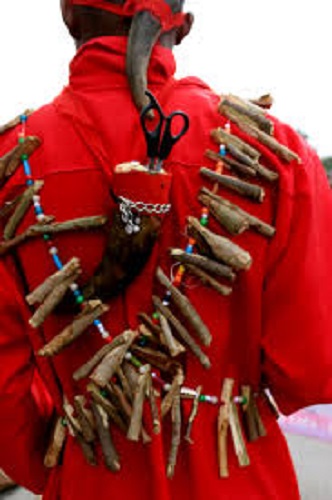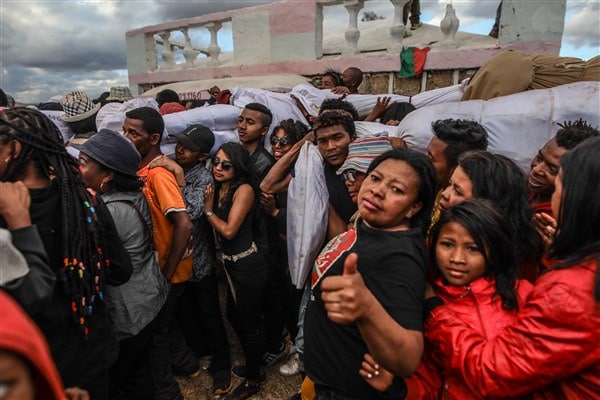Fady or the ritual prohibitions on the island of Madagascar
The life of the Malagasy is characterized by repetitive daily tasks and work. The daily routine in the countryside is mostly limited to getting up, having breakfast, leaving early, working in the fields, returning to the house, eating while it is still light and going to sleep. Far away from the new technologies, development and modern world, we see a balanced social relationship and harmony with our surroundings. This prevailing peace and order in the countryside is firmly anchored in the lives of the inhabitants thanks to the omnipresence of the fady or ritual prohibitions.... They regulate the life of the Malagasy, they mark their daily tasks, they dictate their behavior through a kind of regulations to avoid the limits to drama. In the course of time, they also prove to be guideposts for the Malagasy.
The word Fady comes from the Malay language, the word "Pemali" means illegal or illicit (the ancestors of the Malagasy come from Indonesia). This meaning confirms the prohibition in the word Fady in the Malagasy language, but you can also simply use the word Tabu as a translation here. The word taboo alone does not encompass the meaning of the word fady, which has several meanings: something sacred, forbidden actions, something that cannot be touched, places that cannot be crossed or entered, days where one cannot work, forbidden creatures that bring misfortune or even death. But it can also be food that you must not eat and much more.
Fady or taboos prevail throughout the island and there are thousands of them. They are considered as indispensable requirements, regulations, laws in the life of Malagasy people. They are also general for all 18 Malagasy ethnic groups. Some Fady are nevertheless limited to a particular community or ethnic group and even to a particular person or family. In Malagasy ancestor worship, the souls of the ancestors play a crucial role in the lives of the Malagasy, which is why this ancestor worship is so closely subject to the observances and requirements of the souls of the ancestors.
Ancestor worship also consists of a variety of final and provisional Fady. The observance of the Fady are not all final but they can also be temporary and even disappear depending on the decree of the village elder, the soothsayers and magicians, these people namely play an important role as authority.
This diversity of Fady can be subdivided into 4 categories:
Religious Fady or Taboos through Ancestor Worship
In Malagasy culture, the souls of the deceased live on after death; the soul is immortal. Death is therefore only a transition for further life in the afterlife. These souls, according to our beliefs, still interfere in the existence of the living through their joy or discontent when they are respected or disrespected with the actions of the living. For example, in the funeral rites, there are very many fady that mark the respect of the deceased ancestors. In case of a lack in the observance of the fady can lead to disgrace, calamity or even death. The reason for this is the belief that the soul of the deceased cannot reach the world of the ancestors, which is an indispensable duty and task for the Malagasy. Angry souls are greatly feared, they will cause mischief to the living or in the worst case lead to a new death in the family.
Some examples of fady in ancestor worship are described here: For Sakalava tribes, the house of the deceased must be destroyed or burned. Burials in the morning, Tuesday and Thursday causes more deaths. A male uncut deceased cannot be buried in the family grave any more than a female corpse that has no holes for earrings. There is always a need for purification by fire after a burial....
For amulets, such as success bringers, lucky charms or protection, soothsayers and sorcerers command the holders many fady which they must follow in all circumstances and whose observance is extremely important. In this case it is a mifady, it is about an intention of abstinence to break the rules. A mifady not observed or broken would lead to a visitation, ineffectiveness of the amulets or even death.
Some examples that relate to the use of amulets would be: Consumption of pork, onions or garlic.
Fady the superior or the authority
The Fady of hierarchies is about the place of the individual person in Malagasy society, it is simply about knowing immediately where you belong and being able to adapt your behavior and demeanor to your surroundings.
The caste system involuntarily prevails in Malagasy thought, but especially in Malagasy society we still see nobles, freemen and slaves although the Republic has replaced the Kingdom. The goal is to grant the privileges of everyone and also to avoid any form of rudeness. The hierarchy applies not only in society but also in the family. The kings were the guardians on earth of the will of the ancestors.
Some examples of the superior related Fady: For example, in and around the royal palace there is no toilet because this place is sacred. Pigs are not allowed to be brought there or kept on the hill where the palace is located. . A nobleman is not allowed to carry a corpse, the children are not allowed to build the house to the west of the parents' house, only the patriarch is allowed to eat the backside of a fowl ...
Fady in the AlltaG
By analyzing the above two Fady, we can determine our logic and meaning of respecting Fady: Respect of the ancestors and the superior. But the Fady have long been part of the daily life of the Malagasy and affect all social classes. Sometimes we experience prohibitions without expedient or understandable reasons. These Fady mark the relationship in the family, manners, posture, physical movement, the habits, the use of a certain object, the meals and the family relations among themselves. The fady in everyday life vouch for health and survival in danger.
Some examples of what daily actions might entail would be: Eat with a hat on your head = baldness. Lean against a pillar supporting the roof = lightning strike. Eating standing up = famine. Eating rice in the pot = famine. Using the key = crocodile attack. Putting on green garment in the house = lightning strike. Catching flies = madness. Cutting hair of a sick person = shortens life....
Fady the animals and plants concern
The Malagasy are mostly farmers, livestock and agriculture are integral parts of their existence and therefore they are subject to various taboos. The zebu, an emblem for the Malagasy people, is sacred for some ethnic groups and therefore there are already hundreds of fady that specifically concern these animals. Other domestic and wild animals have fewer fady except perhaps the pig which also carries many prohibitions. In Malagasy culture and tradition, however, all kinds of animals and plants also prove to be Fady: prohibition of killing or eating certain animals or the cutting down of some sacred trees. In the baobabs, for example, live souls of the ancestors and therefore the survival of certain plants and even whole forests is only due to the taboos or fady.
For example: The fenced place where sacred trees grow must be entered barefoot, bringing pigs or often having eaten pork before is strictly forbidden. Violation of this can lead to disease or death. A zebu herder must not eat hedgehogs or the calf will die. Hitting a zebu with a reed = the zebu gets sick or eaten by crocodiles. Buy a pig with the proceeds from selling zebu = poverty. Holding a cat by the tail = cat eats the chicks. Going to the rice fields on Tuesday morning = birds will come to eat the rice grains. The owner of the rice fields starts the rice transplantation, otherwise the rice fields will be mortgaged ....
Author: Hasina Rafidison













